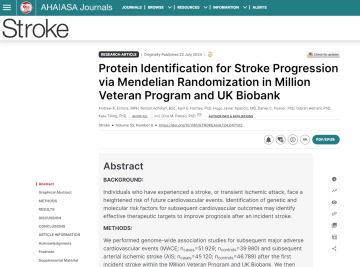Preventing cardiovascular events in stroke patients
Theme Translational data science
Workstream Genetic evidence to prioritise intervention
Status: This project is ongoing
Having a stroke means you are more likely to experience a subsequent cardiovascular event. Cardiovascular events happen when something interrupts the heart’s function. This interruption might damage the heart, lead to a heart attack or cause other complications to develop.
Stroke patients undergoing treatment designed to reduce their chance of experiencing a cardiovascular event still have up to a four per cent chance of having another stroke each year. It is important for us to develop more treatments aimed at preventing these people from experiencing additional strokes or cardiovascular events.
During this project, we will use Mendelian randomisation to identify if there is a causal relationship between protein levels in a stroke patient’s body and subsequent cardiovascular events. Mendelian randomisation is a statistical approach that uses genetics to provide information about the relationship between the cause (exposure) and effect (outcome) of a disease.
Project aims
We will perform a Mendelian randomisation analysis in stroke patients. Our analysis will be aimed at identifying drug targets that may play a role in subsequent cardiovascular events. This means we will try to identify drugs that are already being used to treat other conditions and explore whether they could also help stroke patients.
We will focus our analysis on proteins serving as existing drug targets. This will allow us to identify and repurpose drugs that could be effective in reducing the likelihood of subsequent events in people who have already suffered from a stroke.
This research is part of a PhD project and is being led by Andrew Elmore.
Our work so far:
We used genetic information and medical history data from two large biobanks, the Million Veteran Program and UK Biobank to conduct genome-wide association studies (GWAS). We did this to find potential links between DNA and:
- Initial stroke incidents
- Subsequent stroke incidents
- Subsequent cardiovascular events
A biobank is a database containing biological samples that researchers can study. A GWAS compares the entire genetic information (genome) of many different people to find if there is a link between certain genes and specific diseases or risk of disease.
We looked at the data of 93,422 people who had already had their first stroke. Among them, 51,929 experienced a subsequent cardiovascular event and 45,120 had another stroke. During our analysis, we identified two proteins that are associated with subsequent cardiovascular events, but not initial strokes.
The two proteins we identified are involved in activating inflammation, which plays a key role in the development of strokes and many chronic conditions and diseases. Our findings suggest that inflammation is a contributing factor to additional strokes, and subsequent cardiovascular events, among people who have had their first stroke.
